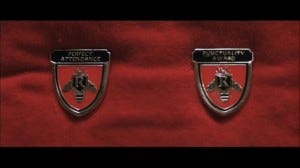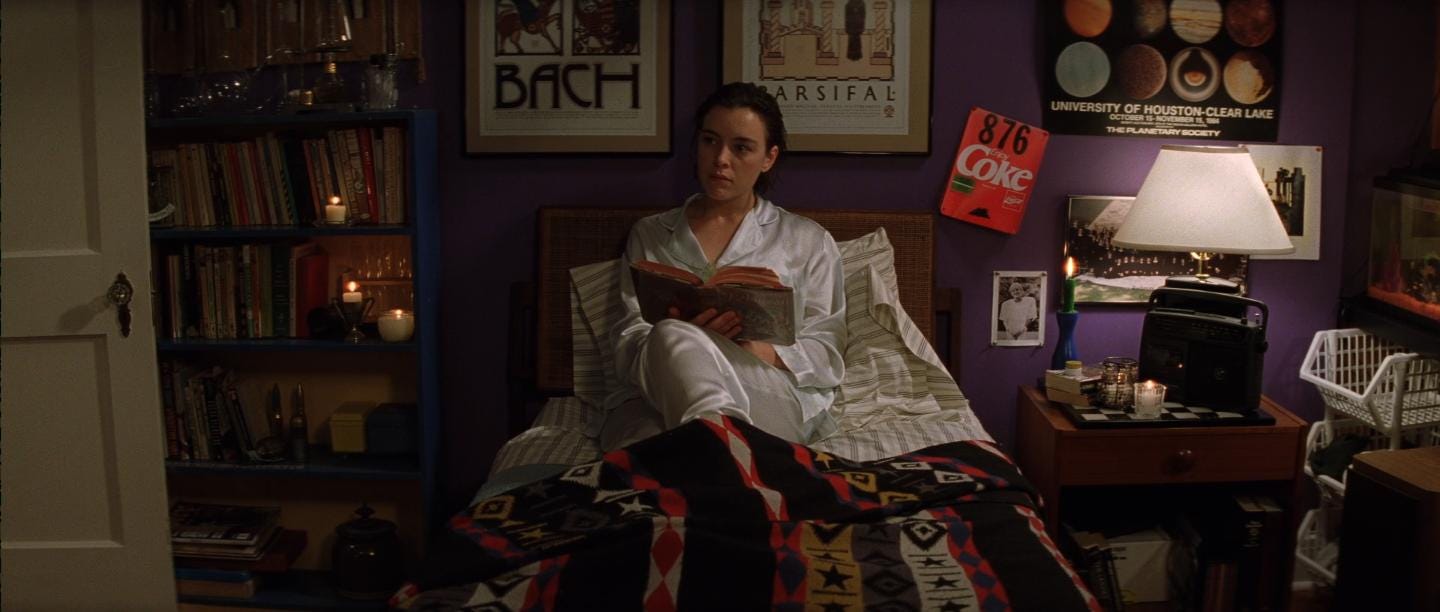At the Heaven and Hell Cotillion
Rushmore, cliches, and growing up
I actually couldn’t believe that Derek—handsome, with a crooked smile and curls tamed by a knitted beanie, whom everyone liked, and who had certainly been cool in high school—wanted to be friends with me, a big nerd. We met in our first year of university. We lived in the same residence and were taking the same first-year great books program. Derek was—and remains—a movie buff; for my birthday last year, he got me a subscription to the Criterion Channel, with which my wife watched many movies, and with which I’m afraid I fell asleep to many excellent ones.
Not long after we started hanging out, it became clear that I had to come clean with him that I hadn’t really seen any movies, and certainly not any films. He was always referencing lines from things I hadn’t seen, and while I was game to laugh, I also knew it was only a matter of time until I was found out. This insecurity about movies was compounded by my sense that I had only a few minutes left until my new friend group realized, as my friends in high school mostly had, that I was (a) hopelessly uncool, (b) kind of uptight, and (c) painfully aware of (a) and (b), which made matters worse.
My movie “collection” consisted entirely of a beloved VHS of Weird Al’s UHF, which my cousin had recorded for me from the TV, and a DVD of Star Wars: Episode 1: The Phantom Menace. The situation was made worse by the fact that the movie theatre in my hometown had (suspiciously) burned when I was in middle school, and was only replaced with a slick new multiplex when I was almost ready to graduate. Anyway, I told Derek that I hadn’t really seen anything and was pleased when he was pleased that I had asked him what I should watch. He told me, solemnly, he’d have to think about it. A few days later he came up to me and without any further introduction said: “Rushmore,” pushing a couple of CD-Rs into my chest.
That night we watched Rushmore in my dorm room. From the opening montage, my ears were hot with humiliation. Jason Schwartzman’s Max Fischer’s earnest extracurricular overcommitment was suspiciously similar to my own. Like Max, I had written for the high school newspaper, spoke French, did model United Nations, acted in plays, considered myself a writer. Like Max, I had certain ill-defined aspirations, and was a bit of an amateur in that fuller, embarrassing sense of someone who dabbles because they love. Was I also pretentious and ridiculous? (yes) Singularly lacking in self-awareness? (again, yes) Max Fischer and I even looked a bit alike, I thought (this actually isn’t true, but none of my reactions were very firmly tethered to reality). My new friend was trying to tell me something of which I was already painfully aware—I was a big dork, and sort of pathetic. Desperate to avoid ruining what I thought was a tenuous position with someone condescending to me from several rungs up the social ladder, I pretended to like Rushmore a lot more than I did.
In the history of people powerfully missing the point of things, my freshman reaction to Rushmore is right up there. Two decades of friendship has shown that I also misunderstood Derek, who, despite being extremely funny and remaining fairly cool, is the opposite of mean-spirited. He showed me Rushmore because it was his favourite movie and was personally important to him. He wanted to share it with his new friend.
My misreading of the movie now seems strangely apt because I unintentionally illustrated Max Fischer’s actual problem: we both needed to grow up, and to address the role imagination plays in that process. In Rushmore, Max is drawn to Herman Blume and Miss Cross—and they, somewhat less understandably to him—because they’re all hurting and need friends. Max’s error is confusing the fantasy he has of himself with who is really is. This is compounded by the fact that who he is, in fact, is someone able to put on a show. Max knows enough to lie about his father’s job—a barber becomes a neurosurgeon—but he’s just-exceptional-enough to delude himself into thinking a beautiful young Harvard graduate and a millionaire industrialist are suitable friends for a fifteen-year-old bullshitter with a unibrow and braces.
But Max initially seems exceptional for his ability to translate his fantasies into reality: he does, after all, save Latin and mounts a hit play. He moves through the world with just enough style and panache, warping reality around him so it conforms to the aesthetics of his Rushmore jacket. But his plays are not really very good, and everything he does has a theatrical quality that leaves him open to Magnus Buchanan’s (Rushmore Academy’s Scottish Nelson Munse) accusation that he’s “a showboat, always talkin’…big show, no results.”
Like many incipient playwrights in the televisual age, Max confuses theatre with TV and movies. He builds elaborate sets and creates impressive special effects, but the scripts themselves are only funny because the subject matter is so inappropriate for the children he casts. Mostly they repeat clichéd movie tropes, which Rushmore itself does with wry allusions to The 400 Blows and The Graduate. In fact, this seems to be the key to many of the things Max does: his precocious self-fashioning recycles clichés and tropes in the quest for authenticity and seriousness. Being cliché—a cliché—is to be avoided because it betrays an inability to think for yourself. But the entire difficulty of being a young person is being unable to do just that. Anderson’s aesthetics allow us to see how Max exaggerates cliches as a way of growing into the person he wants to be.
Fantasies, cliches, tropes are the starting point for the process of growing up—we all begin by using them, and, if we can move beyond them, they give us room to become what we want to be. Becoming aware that one is embodying a cliche is embarrassing, but no more embarrassing than not knowing what is expected in a given situation. As Tocqueville observed, people in democracies aren’t huge on social forms, but these forms are especially useful for those of us who have a sense of what we want to be, but aren’t quite there yet. Forms are especially useful during moments of transition—graduations, weddings, births, deaths—for just this reason: we don’t want to have to figure things out when we’re already shaken by some earthquake of identity.
Think of the the wedding speech, one of the richest contemporary repositories of cliches we have—there you are in your costume, and forced to deliver lines you’ve written for yourself in front, usually, of many friends and family with smartphones. The task of saying something original about love and friendship is simply too much to ask, so I can very sincerely smile my way through many: “I am SO PROUD of the WOMAN/MAN you have become. And in TYLER/MELISSA you have TRULY found a SOULMATE.”
A new way of dressing is a costume until it isn’t; your new university friends are too cool for you until they’re not; it feels weird to be called “professor” until isn’t any longer. Anyone who parents, mentors, teaches is going to see young people embody cliches, awkwardly try on new forms. These things happen, and it’s incumbent upon you—perhaps with Bill Murray’s sad irony—to refuse to comment, and to leave the cliches in place, even if they look “inauthentic” and even if you don’t need them anymore. It’s unhelpful to confuse art with life here: it’s simply fine for people to be cliched in a way that it isn’t for art, because cliche is form improperly done.
In Rushmore, Max needs to negotiate just this difference: the difference between life as performance and the ways that art can help us become who we’re struggling to be. Until fairly late in Rushmore—I’m thinking of the scene where he stages he final attempt at seducing Miss Cross in Edward Appleby’s old bedroom—Max keeps trying to force his fantasies into existence. At one point, Mr. Blume has conveniently destroyed his beloved bicycle, and a little ketchup can make his accident appear credible. But when Miss Cross plays against type and asks Max what exactly he thinks will happen should they consummate their relationship, he has to retreat. He can’t tolerate the possibility Miss Cross might be a sexual being, that the fantasy might happen on any terms that don’t match the ones he’s contrived.
So it takes Max considerable humiliation and quite a while to discern his actual gift: the rare ability to build community. The line between showboating and creating a world that people want to inhabit is quite porous, after all. The long pan of the closing scene, which shows every character in Rushmore who is not acting in the play gathered in the gym at Washington Carver High, serves to reinforce the point. There they all really are. During the play, Heaven and Hell, Max’s take on Apocalypse Now, Max is hit in the head with a rifle—he gets a real version of the wound he previously faked in his botched seduction of Miss Cross. It’s “real” stage combat, after all—the best symbol I’ve seen for the sort of controlled freedom we need to grow up. In this play, Max is the only one getting hurt, and, as he points out to Miss Cross afterwards, he, at least wasn’t hurt too bad.



